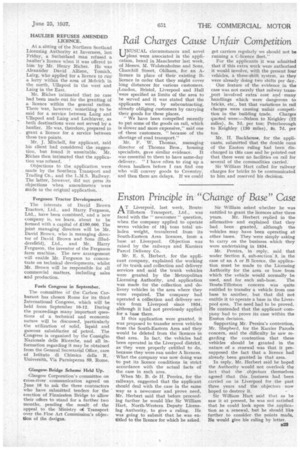Rail Charges Cause Unfair Competition
Page 37

If you've noticed an error in this article please click here to report it so we can fix it.
IJNUSUAL circumstances and novel pleas were associated in the application, heard in Manchester last week, of Messrs. M. Wolstenholme and Sons, Churchill Street, Oldham, for an A. licence in place of their existing Blicence in order that they might cover long distances for various customers. 'London, Bristol, Liverpool and Hull were specified as limits of the area to be served and it was stated that the applicants were, by subcontracting, already obliging customers by carrying their goods for these places.
"'We have been compelled recently to put some of the goods on rail, which is slower and more expensive," said one of these customers, " because of the shortage of road transport."
Mr. F. W. Thomas, managing director of Thomas Bros., housing specialists, gave similar evidence. It was essential to them to have same-day delivery. "I have often to ring up a dozen hauliers before I can find one who will convey goods to Coventry, and then there are delays. If we could
get carriers regularly we should not be running a C-licence fleet."
For the applicants it was admitted that if this extra work were authorized it would involve, with the present four vehicles, a three-shift system, as they were already doing two shifts per day.
One feature of the evidence in the case was not merely that railway trans. ,port involved extra cost and many handlings which were dangerous to bricks, etc., but that variations in rail charges were causing unfair competi
tion in the building trade. Charges quoted were:—Nelson to Keighley (22 Ss. 7d. per ton; Peterborough to Keighley (130 miles), 8s. 7d. per ton.
Mr. H. Backhouse, for the applicants, submitted that the double onus of the Enston ruling had been, discharged in this case and he pointed-out that there were no facilities on rail for several of the commodities carried.
Sir William Hart called for railway charges for bricks to be communicated to him and reserved his decision.




























































































